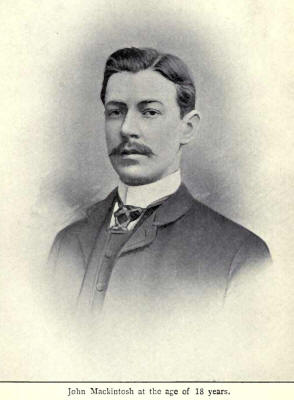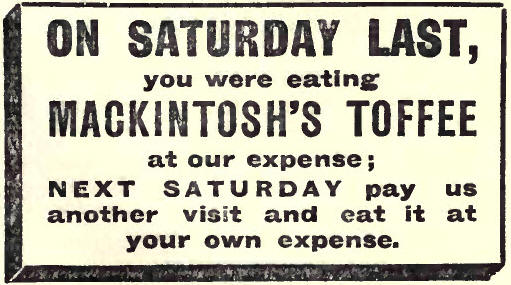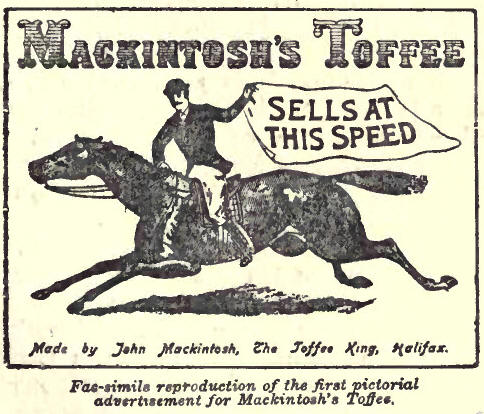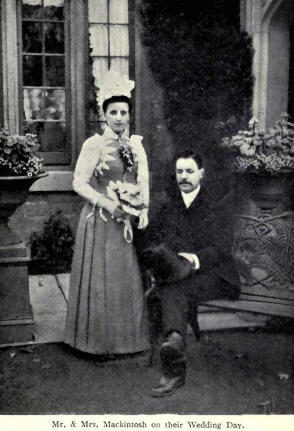|
"Seest
thou a man diligent in his business? he shall stand before kings."—Solomon
(Prov. XXII., 29).
A sack of sugar, a tub of
butter and a few pastries ; these were the capital with which in the year
1890, John Mackintosh began the litde business which grew under his hand
to worldwide dimensions.
The pastry-cook's
shop in King Cross Lane was opened a few days after his marriage, and from
the first his young wife proved to be a true helpmate for him. All their
small joint savings were put into this venture. Even the luxury of a short
honeymoon, which they had cherished, had to be postponed, and the few days
between their wedding and the opening of the
business were spent in purchasing a few extra items of stock with the
remainder of their available cash.
Mr.
Mackintosh's business life may be divided into three periods there were
the opening five years, during which success was secured at once and quick
progress made. Then followed the period of fifteen years when he had to
work hard with practically no profits, a time when several of his
employees were receiving higher remuneration than he was making for
himself. This was the period in which the business was firmly established
on a sound basis. Afterwards came the last period of about ten years, when
real permanent success and affluence were secured. Unfortunately, he was
not permitted to enjoy for long the sweets of prosperity, for he worked to
the last day of his life.
With characteristic business thoroughness, Mr.
Mackintosh kept a careful and extensive diary recording his vast business
experience. These records are full of practical information and
suggestions of real value to business men.
The romantic story of the business told by its
founder :- "The rise and progress of any
business of repute," wrote Mr. Mackintosh, "is of great interest to many
people, and it is because we know this that we have decided to tell to our
millions of customers and others the history of 'Mackintosh's Toffee.' The
founder of the business, whose name it bears, opened his first retail shop
in Halifax, Yorkshire, thirty years ago. From the opening day this shop
attracted customers, the aim of the owner being to offer only articles
extra specially good in an establishment spotlessly clean.
"It was a pastry-cook's business, and people came
from far and near to buy the specialitie offered
for sale. After the first months had gone by the proprietor was casting
about for some new attractions to help to increase the takings of the
shop. In those days half the money taken in an establishment of that kind
was taken on Saturdays; therefore the half holiday was the
'Gala Day.' The assistants were there in full numbers, and Friday
was a hard day in the bakehouse preparing for the great sales day. The
window was packed with meat pies, fruit pies, Madeira
cakes, Eccles cakes, sponge loaves, and a thousand and one other good
things. What else could be put in that crowded window? An idea came to the
proprietor, 'Why not have just one line in
sweets, making it a special
line?

But what? Turkish Delight? Chocolate? Yorkshire Mint
Rock? &c. All were considered, all could be turned to good account, but
none of them appealed to the person most interested.
"Another idea suggested
itself! In those days there was very little in the way of toffee as we
know it to-day. English toffee was mostly hard and brittle, a pure enough
article but, lacking something; at least so thought the originator of
'Mackintosh's Toffee.' It had been noticed that caramels were being
imported into England from America. These were very soft to the teeth.
Then came the great idea! Why not blend the English butterscotch and the
American caramel? Experiments were made and an article was produced which
was named 'Mackintosh's Celebrated Toffee.'
"An advertisement was put out locally in Halifax, inviting the public to
come and taste a free sample at our establishment. Hundreds came and long
before closing time we were 'Sold out!'
"On the Monday morning following, another
advertisement appeared reading like this :-

And they
did! When business opened on Saturday morning there was the largest
display of toffee (or any other special sweetmeat) ever
seen in Halifax. It began to look like a toffee shop. The pies and the
cakes, the cheese tarts and the Eccles cakes, made a brave show, but the
little mountain of deliciously inviting toffee made your mouth water.
"It could only have one end. We
kept the money separate for the toffee, and before long the takings for
the latter outstripped the receipts for all the rest of the articles sold.
"The window was painted in nice
bold letters denoting that the establishment was intended to be a
high-class pastry-cook's, but the public altered all that, they called it
'The Toffee Shop,' and people came from all parts of Halifax for the
popular commodity, but it does not come to all to carry these small
beginnings to national and then to international success."
This interesting account was, at a
later date, supplemented by Mr. Mackintosh with the following further
details:-
"I spent
the first six years, buying experience, cutting my wisdom teeth, and
putting back into the business every penny I made.
"The one great danger in a fast
growing business is that of shortage of capital for although one can
usually get all the capital one requires after a business has succeeded,
few can get it when it would seem most useful, at the beginning.
"Now a good thing soon becomes
known few people are really selfish enough to keep a good thing to
themselves; so very soon the fame of the Halifax Toffee had reached
neighbouring towns and retailers were beginning to sell it.
"That was the commencement of the
wholesale business, which rapidly spread out first to the West Riding,
then to the whole of Yorkshire, then to other parts of the North of
England, and so on, until it was being sold North, South, East and West.
"Nor did it stop there. The
Colonies quickly showed that they wanted this good old English toffee, and
other countries, too, demanded it; so that to-day from China to Peru, and
almost from Pole to Pole, there is scarcely a country that does not know
'Mackintosh's Toffee.' So from that little 'Toffee Shop' a huge factory
employing over 1,000 people has grown and given to Halifax a new fame and
a new name; for it is known to-day, the world over, as 'Toffee Town.'
"Almost every town has a shop of
some kind with a history of success in some speciality but it does not
come to all to carry these small beginnings to national and then to
international success."
This interesting account was, at a later date,
supplemented by Mr. Mackintosh with the following further details :-
"I spent the first six years,
buying experience, cutting my wisdom teeth, and putting back into the
business every penny I made.
"The one great danger in a fast growing business is
that of shortage of capital ; for although one can usually get all the
capital one requires after a business has succeeded, few can get it when
it would seem most useful, at the beginning.

"This is
not an unmixed evil, for at any rate it ensures that one will look before
one leaps. I did succeed in borrowing £50 when I commenced business, but I
got a good blowing up because I was half a day late with my interest at
the end of the first half year. I paid both principal and interest shortly
afterwards. I had more anxiety about that £50 than 'I
had from anything else in connection with the business. Later I had good
big overdrafts at the bank, but that was child's play in comparison;
because bank managers when they have once agreed to lend you a sum of
money, don't follow you about to see if you go to 'The Pictures,' or if
your wife has got a new hat. They take good care before they lend, to make
sure that you and your business are worth it. But once they have taken the
plunge it's up to you to justify their confidence, and they don't harass
you. Of course, at one time or another, most business houses have had
their principal in the 'inner room,' but one of our leading bankers
recently said, 'If there is any sweating done in that room, the sweating
is done by the bank manager!'
"I have no doubt it is a mutual affair, with the odds
against the borrower. Since then I have had the pleasure of being invited
to the aforesaid room when, I have been lending to the bank, but I always
have a 'What are you doing there, you naughty boy,' sort of feeling,
reminiscent of those days when my errand was rather different. But I must
leave a correct impression. I can honestly say that my bankers have
treated me justly. At times when I rather looked for criticism they have
surprised me with their trust in my word and their decision to back my
judgments, and to them must be given some credit for their share in the
development of my business. This is the true method of banking in my
opinion, to help to develop the businesses of the town, taking legitimate
risks along with the manufacturers or merchants.
"The second six years were taken
up in establishing business in the North of England and in the Midlands.
Our method was to work a county at a time and do it thoroughly. No town
was missed, but each was worked methodically. A map was kept in the
office, with pins something like those used in marking the advances on the
war maps, and different coloured pins were used as 'unworked' towns became
'worked' towns.
"This kind of thing went on for many years, until at last we could say
that there was not a town and scarcely a village where our goods were not
to be found. Every town is regularly visited by our representatives. We do
nothing slovenly or half-heartedly. We have a system, and no one is
allowed to upset it.
"Just going back to the beginning again, I would
recommend any person in business not to try to do too much in one day. I
remember the time when I worked hard all day at the factory and then
started on my books at night, thereby half killing myself. When I got some
one to do the books I saw what a fool I had been, for the relief was
great, and part of the time saved I was able to put into the development
of new schemes, and thus get the business further ahead with less
expenditure of energy. It is the direction of energy that counts in
business. If anyone in a business should have time to spare it is the
principal. If his every moment is occupied there is no time to think, plan
and scheme. Most businesses are crippled because the chief is occupied
from morning to night with all sorts of things that are of minor
importance. Unless they are of the greatest consequence strike against
your own system and make time for thinking."
The first supply of the toffee
that was afterwards to acquire a world-wide fame was boiled by Mrs.
Mackintosh in a brass pan over the kitchen fire. In those days it took an
hour to boil and cool ten pounds of toffee; to-day, the steam pans, each
holding several hundred-weights, are turning out nearly ten tons an hour,
and much of the machinery in use was invented by Mr. Mackintosh.
Six months after the little
business had been established in King Cross Lane, Mr. Mackintosh came to
the momentous decision to leave his secure position in the mill and devote
all his energies to the success of the new venture.
Highly coloured and highly
flavoured sweets were then popular, and these, together with chocolates,
had the confectionery trade practically to themselves. Mr. Mackintosh's
venture was regarded as risky, but from the first he realised the value of
such a homely commodity as toffee as a commercial article, and from being
a trivial article of trade he raised it to its present position as the
national sweetmeat.
He knew nothing of such articles as glucose, vanillian
crystals, &c., nor even of thermometers there were just sugar and butter,
with a pan in which to boil the mixture. Good quality commonsense, fair
dealing and advertising did the rest. There is a Yorkshire couplet—
"Early to bed, early to rise,
Never get drunk and advertise."
It is doubtful whether Mr. Mackintosh adopted the first
suggestion, for he had to work both early and late. He certainly never got
drunk; but from the very commencement of his business he advertised.
Trade increased so rapidly that
the shop became too small, and a stall was opened in the market, a smart
young man being put in charge. The toffee was still boiled at home, poured
into trays, and packed in a tin travelling trunk. It was carried to market
in a hand-cart, and was broken up with a hammer on arrival. Not till years
later was it cut up by machinery into small pieces and wrapped and packed
in the dainty, form now familiar to us. The hand-cart was at Length
superseded by a horse and cart. The horse was bought by Mr. Mackintosh for
£11 and was named "Tommy." Some years afterwards "Tommy" was sold for
37/6. On hearing of this transaction, Mrs. Mackintosh remarked, "And I
have just paid 37/- for a wooden horse for the children."
Soon the retail shop gave place to
a small manufacturing business, and its first home was in a warehouse in
Bond Street, Halifax. This was in 1894. The following year the business
was removed to somewhat larger premises in Hope Street—an appropriate
name—the top floor of which was rented. Trade continued to increase, and
in 1899 the factory in Queen's Road was built and equipped with the most
modern machinery. The following year the business was turned into a
private company, and other factories were acquired in the town.
When the business expanded to
national dimensions the Company's financial resources were drained to the
last farthing, and the chief difficulty was not to get trade, but to find
the money requisite to run the works. Though the business was highly
successful, the want of capital on several occasions nearly brought it to
an end. Money was required for the purpose of extension both at home and
abroad. The pinch was felt most severely at the close of the South African
War, when the Government put a tax on sugar. This made the confectionery
trade a lean thing just at the time when fresh capital was needed in every
direction.
But
difficulties only proved the man. A directors' meeting was held in Mr.
Mackintosh's home, when he was suffering from a severe attack of gout. The
bank was pulling him up when the business was making great headway. No
possible means of getting over the difficulty presented themselves. The
outlook was black, and even to continue to run the works for another week
appeared impossible. But in face of impending disaster his faith and
courage did not falter, and he declared that he 'would never be beaten,
and if necessary he would begin again at the bottom.'
Mr. Mackintosh possessed a
wonderful power of inspiring others with his own optimism. Even the least
hopeful began to believe in the possibility of success. At length the
clouds rolled away; but for many years not a single penny was paid in
dividends.
Some
people do not care to be reminded of their early days, when with little
experience, less capital and no encouragement, they fought their way to
the top. But Mr. Mackintosh was always ready to talk about his early
struggles, and though he could laugh and jest over experiences that were
grim enough at the time, he was never ashamed of them. He had proved that
he was acting on sound lines, and there is much satisfaction in finding
that the hopes and aims of past days have been realised.

It was the remembrance of his own
trials that caused him to lend a sympathetic ear, and often helpful hand,
to other business men in difficulties. Of many such kindly deeds there is
no record, for 'He did good by stealth, and blushed to find it fame,' and
he endeavoured to make those he thus lifted up feel that they were under
no obligation to him. So long as the man was obviously trying to do his
best, Mr. Mackintosh would trust him absolutely, and whether things went
well or ill would never chide or complain; nor did he expect to share in
the success which he helped to achieve.
The strain of a great business did
not make him slack in his work for the Church and Sunday School. He would
often remain at his office until 7 or 8 o'clock in the evening, then go
straight to Queen's Road Sunday School to attend a Church meeting, either
of a business or religious character, returning at its close to his desk
until midnight. Nor did he regard this work as being of small value to
himself, for he frequently declared that much of his ability to conduct
his own business and to deal tactfully with other men came from the
experience gained when in office in the Sunday School.
Mr. Mackintosh's family naturally
displayed a keen interest in the business. When his eldest boy was only a
little fellow, he used to include in his prayers the following quaint
petition: "Oh Lord take care of the works, and never let them be 'blowed'
up, nor 'blowed' down. And they were not; but he forgot to mention fire.
On November 2nd, 1911, the works at Queen's Road were burned to the
ground. This disaster coming just when the worst of Mr. Mackintosh's
difficulties were surmounted, was a heavy blow to him. His house was only
a short distance from the factory, and in the dead of night he was
awakened by a man informing him that a little puff of smoke was issuing
from under the warehouse door. This was evidently his kindly way of
breaking the news, for he had scarcely uttered the words when the roof of
the factory fell with a crash, and the glare of the flames illuminated the
country-side for miles around.
Mr. Mackintosh was quickly on the spot, and after doing
all that was humanly possible, he saw that the works were doomed. His
mother's house was opposite the burning building, and this greathearted
man took his wife across, and together with the mother they knelt in
prayer on the floor of the little parlour. There, with the room lighted up
by the flames from the ruins across the road, they commended themselves
and all their affairs to their Heavenly Father's keeping, and "cast their
burden on the Lord."
This was the last serious check that Mr. Mackintosh had
to sustain, and he acted promptly, with his accustomed energy and
foresight. The business was at once transferred, in part, to premises
adjoining Halifax Station. Gradually the entire business was resumed in
the newly acquired buildings, and then rapidly extended, until at length
the present large group of factories was occupied. These splendidly
equipped works are ten times greater in capacity than the one destroyed by
fire in Queen's Road. That factory has now been rebuilt, and is the home
of the chocolate branch of the business. It is an interesting comparison
to note here that for many years the great firm of 'John Mackintosh Ltd.'
has produced toffee in such huge quantities, that it has had the heaviest
railway carriage account of any firm in Halifax and district.
When the first company of John
Mackintosh Limited was floated in the year 1899 the capital was £15,009,
Mr. Mackintosh receiving as the purchase price a large proportion of the
Ordinary Shares. The issue, small as it was, proved to be greater than the
faith of the promoter, for it was under-subscribed by the sum of £3,000.
It was essential that the entire amount should be raised in order to
complete the building of the new factory. Mr. Mackintosh requested his
solicitor to accompany him to the bank, where they interviewed the
manager, and asked for a loan of £3,000. The manager was indignant, and
resented even being asked to make such an advance for the purpose of
manufacturing toffee. "Why," said he, astonished at the audacity of the
applicant, "if you made all the toffee that the United Kingdom could
consume, you could never employ £15,000 capital. I call it fool-hardy! "
The bank manager was obdurate for a time, and absolutely declined to find
the money. But after three other interviews he relented though, before the
money could be obtained, Mr. Mackintosh had to deposit as security every
share he had received in payment for the business.
The local printer who printed the
prospectuses of the company relates that, when Mr. Mackintosh went to pay
the account he was given half-a-dozen spare copies which were left over.
Putting them into an envelope, Mr. Mackintosh said, "We will keep these;
they will come in useful when we are floating it for £100,000." Since
then, in the present year, 1921, the new company of John Mackintosh &
Sons, Limited, has been formed, with a capital of £750,000!
Such is the romance of business.
|

